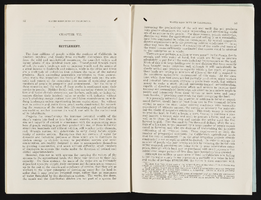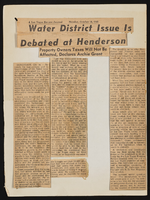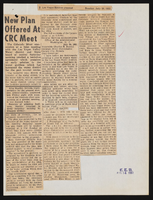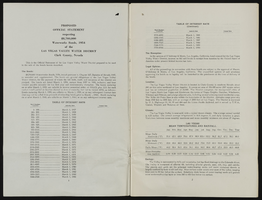Search the Special Collections and Archives Portal
Search Results
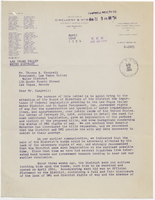
Letter from Franklin T. Hamilton (Los Angeles) to Thomas A. Campbell (Las Vegas), April 22, 1954
Date
Archival Collection
Description
Letter addresses pending federal legislation's possible influence on the water district's selling of bonds.
Text

Transcript of interview with Edward Gregory by Jonathan Bellingar, March 2, 1977
Date
Archival Collection
Description
On March 2, 1977, Jonathan R. Bellingar interviewed Edward Gregory (born July 28, 1922) about his life in Nevada. The interview takes place at Nellis Air force Base; also present during the interview is an unidentified man. Gregory was born and raised in Nevada; he discusses leaving Nevada to serve in the Army during World War II before eventually returning to Nevada in 1950. The interview concludes with a brief overview of how Nellis Air force Base has changed since the 1950s.
Text
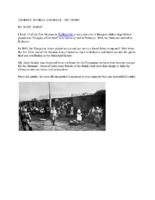
Biographical essay by Rudy Horst, 2014
Date
Archival Collection
Description
Rudy Horst was a prisoner at Auschwitz and was part of the Death March from Warso to Kutno, then transported to Dachau. He was liberated from the camp at Muldorf in 1944. He came to the United States in 1948.
Text
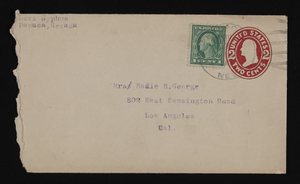
Correspondence, Levi Syphus to Sadie George
Date
Archival Collection
Description
Text

Maria Casas interview, June 12, 2019: transcript
Date
Archival Collection
Description
Interviewed by Maribel Estrada Calderón. Farmersville is described as a small town between, Exeter and Visalia, California populated by Mexican American farm workers. It is in this small town, where UNLV History Professor Maria Raquél Casas spent her childhood raised along with her sisters and brothers. In her interview, Dr. Casas describes how growing up in this small town with her traditional Mexican family influenced the person she is today. While working alongside her family in the fields, Dr. Casas decided that she would strive to obtain an education. Through hard work and constant support from her sister, Dr. Casas attended Fresno State, where she discovered her love for history. Upon completing her undergraduate program, Dr. Casas made the decision to further her education by pursuing a master's at Cornell University. At Cornell, she faced discouraging professors who believed she would not be able to complete the master's program let alone pursue a PhD program. Despite these demoralizing professors, Dr. Casas completed her program and was admitted into University of California Santa Barbara's history program. Dr. Casas never forgot her roots or the significance of her presence in the majority white academic spaces she attended during her academic journey. When she arrived at UNLV, she continued to strive for more Latino representation in both the student population and in the school faculty. During her tenure at UNLV, Dr. Casas has served as an advisor for multiple Latino student organizations including MEChA and SoL. Dr. Casas has witnessed much progress in Latino representation at UNLV, but she believes there is still much work left to be accomplished.
Text

